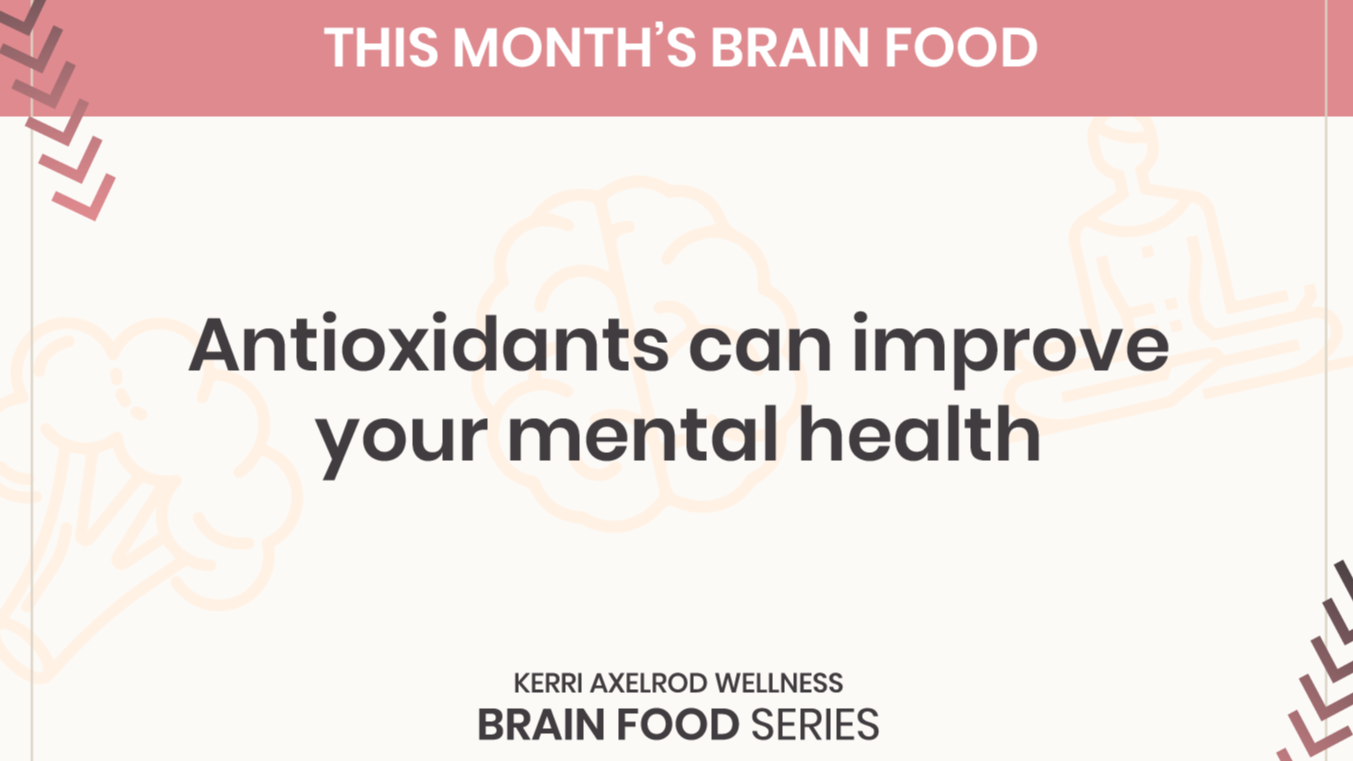BRAIN FOODS: Role of Antioxidants in Anxiety and Depression
Jul 18, 2019
What are antioxidants?
Antioxidants are buzz words in the nutrition and skincare worlds, but what are they exactly? What roll do antioxidants play in our mental and overall health and what makes them a Brain Food?
In very simplified terms, antioxidants are molecules that fight damage caused by free radicals. Free radicals are unstable molecules in our bodies that can destroy cells, cause disease, and speed up the aging process.
Free radicals are byproducts of natural body processes such as breathing, digestion, and cellular metabolism. Without antioxidants free radicals would destroy our bodies very quickly through a process known as oxidative stress. However, it's important to keep in mind that free radicals also serve important functions. For example, the body's immune cells use free radicals to kill harmful bacteria (source).
Factors and activities that increase the production of free radicals and oxidative stress in the body include:
- excessive exercise
- inflammation and injury
- refined and processed foods, trans fats, artificial sweeteners, and certain dyes and additives
- smoking
- environmental pollution
- radiation
- exposure to pesticides and drugs
- industrial solvents
- UV light

If not regularly cleared from the system, free radicals can cause cell damage, contribute to the development of many illnesses, and generally promote the premature aging.
Illnesses associated with oxidative damage include heart disease, mental illness cancer, arthritis, stroke, respiratory diseases, immune deficiency, Alzheimer’s and Parkinson's disease, and other inflammatory conditions.
Common Antioxidants
Antioxidants can protect cells against oxidative stress and are abundant in colorful fruits and vegetables. Many antioxidants have anti-inflammatory properties as well. The body naturally produces some antioxidant compounds on its own, while others are obtained through the nutrient-rich foods. Examples of antioxidants include:
- vitamin A, vitamin C, vitamin E
- beta-carotene
- lycopene
- lutein
- selenium
- manganese
- zeaxanthin
- curcumin
- Flavonoids, flavones, catechins, polyphenols, and phytoestrogens found in plant-based foods.

Antioxidants role in mental health
There is growing evidence to suggest that the imbalance between oxidative stress and the antioxidant defense system may contribute to the development of depression and anxiety (source). Anxiety is thought to be correlated with a lowered total antioxidant state and enhancing your diet with foods rich in antioxidants may help ease the symptoms of anxiety disorders (source).
The idea is that antioxidants can remove free radicals and suppress the oxidative stress pathways, which protect against neuronal damage in the brain; thus, theoretically resulting in remission of depression or anxiety symptoms (source).
One study found that patients with generalized anxiety disorder and depression had significantly lower levels of vitamins A, C, and E in comparison to healthy controls. After dietary supplementation of these vitamins for a period of 6 weeks, a significant reduction in anxiety and depression scores of patients was observed. A significant increase in the blood levels of antioxidants was observed in patients except that of vitamin E in the group of depressed patients (source). The findings suggest that antioxidant supplement therapy as an adjuvant therapy is useful in patients with stress-induced mental illness.
It is worth noting that a healthy microbiome is essential to absorbing antioxidants when consumed through food. Read more about how to improve your gut health here.
Additionally, oxidative stress is a major component leading to inflammatory responses (source). Under normal physiological status, oxidative stress and immune system activation are generally short-lived. In certain chronic disease states, however, both of these systems remain activated (source). Such co-activation over time may lead to a higher risk of disease as well as increased severity (source). Consistent with experimental animal study, elevation in the activation of inflammatory pathways has been also observed in patients with anxiety disorders and major depression (source).

Food Sources of Antioxidants
Tomatoes
Tomatoes are loaded with health-protective antioxidants such as lycopene, vitamin C, and vitamin A. Lycopene is the antioxidant that gives tomatoes their rich red color. When tomatoes are heat-treated, the lycopene becomes more bio-available (easier for our bodies to process and use).
Peppers
Bell peppers are rich in many vitamins and antioxidants, especially vitamin C and various carotenoids. For this reason, they may have several health benefits, such as improved eye health and reduced risk of several chronic diseases.
Brazil Nuts
Brazil nuts are among the richest dietary sources of selenium, an essential mineral with antioxidant properties. Selenium plays critical roles in reproduction, thyroid hormone metabolism, DNA synthesis, and protection from oxidative damage and infection. It is important to note that a single Brazil nut contains 68 to 91 micrograms (mcg) of selenium, meaning that just one nut per day can provide the daily recommended adult allowance of 55 mcg. Too much selenium can be toxic, so keep portion sizes in mind. I like the Now Foods Organic Brazil Nuts.
Berries
Berries such as blackberries, cranberries, raspberries and blueberries are a great source of antioxidants, such as anthocyanins, ellagic acid, and resveratrol. One study showed that blueberries, blackberries, and raspberries have the highest antioxidant activity of commonly consumed fruits, next to pomegranates (source).
Spices
Spices with both antioxidant and anti-inflammatory properties include turmeric (containing the active ingredient curcumin) and ginger. Turmeric has been used in India as part of Ayurvedic medicine for thousands of years. Curcumin is poorly absorbed into the bloodstream alone so it is best to consume with black pepper. One turmeric based product that I love is the Organic Turmeric Blend from Terra Origin. This product contains organic turmeric and is blended with organic black pepper, ginger and cardamom for maximum anti-oxidant and anti-inflammatory benefits.
Antioxidants are not a standalone treatment for mental illness and we are still understanding the overall role that food plays in our mental health, but the research does show that antioxidants may be beneficial in conjunction with other treatment therapies. As always, work with a qualified healthcare practitioner based on your individual symptoms. Read more about other Brain Foods here.
Thank You Terra Origin for sponsoring this post and thank you for supporting the brands that make this blog possible. As always, opinions are my own.
Struggling with Gut Issues, Hormonal Shifts, or Perimenopause Symptoms? Let’s Change That.
I’m Kerri Axelrod, a Functional Medicine Registered Dietitian Nutritionist specializing in gut health and perimenopause. I help millennial women in their 30s and 40s who are tired of feeling bloated, exhausted, foggy, “off” in their own bodies, or struggling with digestive issues finally get real answers (and a plan that works!)
Using advanced lab testing and personalized nutrition strategies, we’ll uncover the root causes of your symptoms and help you get back to feeling like yourself again (or maybe even better than before).


